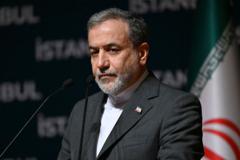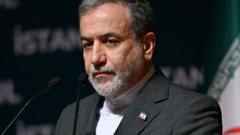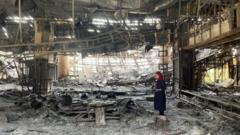Iranian Foreign Minister Abbas Araghchi admitted to "excessive and serious" damage to nuclear facilities following recent US and Israeli bombings, challenging Supreme Leader Khamenei's assertions of no disruption. The Iranian government plans to reassess its diplomatic stance, with talks suspended indefinitely, as tensions and conflict with Israel escalate.
Iran Acknowledges Extensive Damage to Nuclear Infrastructure Amidst Ongoing Tensions

Iran Acknowledges Extensive Damage to Nuclear Infrastructure Amidst Ongoing Tensions
Amid conflicting statements from Iranian officials, Foreign Minister Abbas Araghchi reveals significant damage to nuclear sites, contradicting the Supreme Leader's claims.
Iran’s Foreign Minister, Abbas Araghchi, has confirmed reports of "excessive and serious" damage to the nation's nuclear sites as a result of bombings carried out by the United States and Israel. This admission, made during a state broadcast on Thursday evening, stood in stark contrast to statements made only hours prior by Iran's Supreme Leader Ayatollah Ali Khamenei, who claimed the strikes had not affected the country’s nuclear program. Khamenei accused US President Donald Trump of over-exaggeration, asserting that the attacks had failed to achieve any collective goals against Iran.
Araghchi's remarks hint at more severe assessments of the damage being conducted by the Atomic Energy Organization of Iran, even as Khamenei remains concealed since the onset of the conflict with Israel on June 13. The stark differences in messaging suggest rising internal tensions, as Iran continues to grapple with the fallout from these attacks.
The Foreign Minister further announced that Iran has no intentions of renewing nuclear negotiations with the US, indicating a more isolationist approach from the Islamic Republic. He stated clearly, “no agreement, arrangement or conversation has been made to start new negotiations,” referencing the cancellation of previously scheduled discussions when Israel intensified its military offensive.
Meanwhile, the Trump administration has floated proposals to rekindle negotiations, including potentially allocating $30 billion towards a civilian nuclear energy program, contingent on a lifting of certain sanctions. However, further complications arise from Iran’s parliament approving a measure aimed at halting cooperation with the International Atomic Energy Agency (IAEA), which could bar nuclear inspectors from accessing the country's nuclear sites.
Israel has justified its military operations in Iran as a necessity to prevent what it views as imminent threats linked to the Iranian nuclear weapons program. Tehran, however, maintains that its nuclear developments are intended solely for peaceful purposes. The recent military engagement escalated over the previous weekend, with US forces involved in strikes against strategic Iranian facilities in Fordo, Natanz, and Isfahan.
While US Defense Secretary Pete Hegseth suggested that the assaults inflicted serious setbacks to Iran's nuclear ambitions, preliminary Pentagon reports indicated only minimal delays to the program, a claim swiftly downplayed by the administration. Additionally, Iran's health ministry has reported disturbing casualty numbers, with at least 610 deaths recorded since the onset of airstrikes by Israel. As the Iranian populace slowly returns to normalcy, the prevailing sentiment remains one of anxiety and distress amidst political and military upheaval.





















